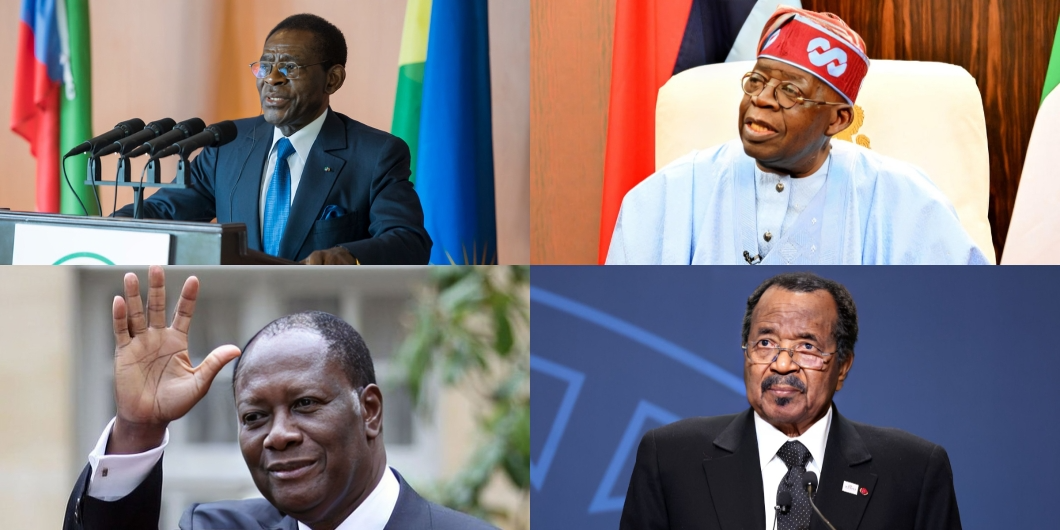In many African countries, power is a long-term commitment, sometimes extending across decades, coups, and constitutional changes. While some leaders symbolise stability, others represent a continent’s ongoing struggle with leadership renewal and endless devouring of the national cake.
From Cameroon to Côte d’Ivoire, here are the oldest presidents still in power across Africa in 2025, and how they’ve held on through shifting political tides.
1) Paul Biya — Cameroon
Age: 92
Assumed office: 6 November 1982.
Cameroon’s Paul Biya is the world’s oldest serving non-royal head of state. After taking office in 1982, Biya has held power for over four decades. He is often hailed for his calm demeanor, yet criticised for centralised rule and limited political reform.
2) Jean-Lucien Savi de Tové – Togo
Age: 86 (2025)
Assumed Office: May 2025
In a somewhat surprising rise, Jean-Lucien became Togo president in 2025 under a new political arrangement that gave him a largely ceremonial role. His leadership represents a generational contrast in Togo’s evolving political landscape.
3) Peter Mutharika – Malawi (returned to power in October 2025)
Age: 85 (2025)
Assumed office (recent return): 4 October 2025
After years away from politics, Peter Mutharika made a comeback in 2025, marking one of the most dramatic political returns in recent African history. The 85-year-old’s second coming comes amid Malawi’s calls for economic revival.
4) Nangolo Mbumba — Namibia
Age: 84 (2025)
Assumed office: February 2024
Mbumba became Namibia’s president after the passing of former President Hage Geingob. A quiet, respected statesman, he is seen as a steady transitional figure guiding Namibia through a sensitive political moment.
5) Teodoro Obiang Nguema Mbasogo — Equatorial Guinea
Age: 83 (2025)
Assumed office: 3 August 1979.
Teodoro has been in power since 1979 when he took over the military before transitioning to formal presidency). Obiang is the world’s longest-serving head of state. His leadership has brought oil wealth to Equatorial Guinea, but also decades of accusations of human rights violations and corruption.
RELATED: Oldest World Leaders in 2025: Is Tinubu on the List?
6) Alassane Dramane Ouattara — Côte d’Ivoire
Age: 83 (2025)
Assumed office (current term): 6 May 2011 (after 2010 election dispute)
Ouattara rose to power after a tense post-election crisis in 2010. Since then, he’s sailed Côte d’Ivoire toward economic growth and stability, though critics say his multiple re-elections test the limits of the nation’s democracy.
7) Emmerson Mnangagwa — Zimbabwe
Age: 83 (2025)
Assumed office: 24 November 2017.
Emmerson is known as “The Crocodile” for his political cunning behaviour. Mnangagwa succeeded Robert Mugabe in 2017. Economic challenges and calls for deeper political reform have marked his tenure.
8) Denis Sassou-Nguesso — Republic of the Congo
Age: 81 (2025)
Current continuous term began: 25 October 1997
A key political player since the late 1970s, Sassou-Nguesso’s combined rule spans more than 35 years. His leadership has survived civil conflict, constitutional changes, and growing demands for generational change.
9) Yoweri Museveni — Uganda
Age: 81 (2025)
Assumed office: 29 January 1986.
Museveni came to power after a rebellion in the mid-1980s and has ruled Uganda ever since. His longevity has brought both stability and criticism over democratic backsliding and the silencing of opposition voices.
RELATED: Top 10 most hated political figures in the world
10) Joseph Boakai — Liberia
Age: 80 (2025)
Assumed office: 22 January 2024.
Boakai, a former vice president, won power in 2024 with a promise to rebuild Liberia’s institutions and tackle corruption. His leadership marks a return to old-school politics in a youthful nation.
11) Isaias Afwerki — Eritrea
Age: 79 (2025)
Assumed office: 24 May 1993
Eritrea’s only president since independence, Afwerki is a symbol of self-reliance and discipline; yet, his country is often dubbed “the North Korea of Africa” for its lack of press freedom and mandatory military service.
12) Abdelmadjid Tebboune — Algeria
Age: 79 (2025)
Assumed office: 19 December 2019.
Tebboune emerged from the ashes of Algeria’s 2019 protests that ended decades of Bouteflika’s rule. His presidency is seen as an attempt to reform from within, though the youths retain their skepticism about him.
RELATED: The youngest presidents in US history, ranked — Theodore Roosevelt is number one
13) Ismail Omar Guelleh — Djibouti
Age: 77 (2025)
Assumed office: 8 May 1999.
Guelleh has maintained tight control over Djibouti for more than two decades. His small but strategically located country remains vital to global powers due to its Red Sea ports and foreign military bases.
14) Bola Ahmed Tinubu — Nigeria
Age: 73 (2025)
Assumed office: 29 May 2023.
Tinubu came into office in 2023. His presidency faces harsh scrutiny as the country faces inflation, insecurity, and calls for generational leadership.
15) Abdel Fattah Saeed Hussein Khalil el-Sisi — Egypt
Age: 70 (2025)
Assumed Office: June 8, 2014
Abdel Fattah el-Sisi is an ex-army general who rose to power after leading the 2013 military takeover that overthrew then-President Mohamed Morsi.
Since he became president, his government has maintained a firm grip on Egypt’s political and social life, prioritising national stability, security, and massive infrastructure projects. While supporters praise his focus on development and modernisation, critics say his rule is increasingly authoritarian, with limited political freedom and strict control.
RELATED: 2 Nigerian presidents assassinated in office — Who killed them?
While experience brings wisdom, the continent’s growing youth population is increasingly demanding change, which raises a pressing question: how long should one generation hold the reins of power?
>

